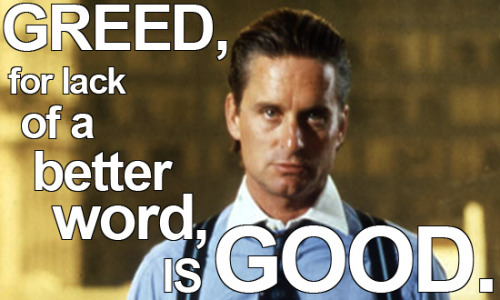G
Guns Guns Guns
Guest
Almost a quarter of a century has passed since the release of the movie “Wall Street,” and the film seems more relevant than ever.
The self-righteous screeds of financial tycoons denouncing President Obama all read like variations on Gordon Gekko’s famous “greed is good” speech, while the complaints of Occupy Wall Street sound just like what Gekko says in private: “I create nothing. I own,” he declares at one point; at another, he asks his protégé, “Now you’re not naïve enough to think we’re living in a democracy, are you, buddy?”
According to the prediction market Intrade, there’s a 45 percent chance that a real-life Gordon Gekko will be the next Republican presidential nominee.
I am not, of course, the first person to notice the similarity between Mitt Romney’s business career and the fictional exploits of Oliver Stone’s antihero.

In fact, the labor-backed group Americans United for Change is using “Romney-Gekko” as the basis for an ad campaign.
But there’s an issue here that runs deeper than potshots against Mr. Romney.
For the current orthodoxy among Republicans is that we mustn’t even criticize the wealthy, let alone demand that they pay higher taxes, because they’re “job creators.”
Yet the fact is that quite a few of today’s wealthy got that way by destroying jobs rather than creating them.
And Mr. Romney’s business history offers a very good illustration of that fact.
http://www.nytimes.com/2011/12/09/opinion/krugman-all-the-gops-gekkos.html?_r=1
The self-righteous screeds of financial tycoons denouncing President Obama all read like variations on Gordon Gekko’s famous “greed is good” speech, while the complaints of Occupy Wall Street sound just like what Gekko says in private: “I create nothing. I own,” he declares at one point; at another, he asks his protégé, “Now you’re not naïve enough to think we’re living in a democracy, are you, buddy?”
According to the prediction market Intrade, there’s a 45 percent chance that a real-life Gordon Gekko will be the next Republican presidential nominee.
I am not, of course, the first person to notice the similarity between Mitt Romney’s business career and the fictional exploits of Oliver Stone’s antihero.

In fact, the labor-backed group Americans United for Change is using “Romney-Gekko” as the basis for an ad campaign.
But there’s an issue here that runs deeper than potshots against Mr. Romney.
For the current orthodoxy among Republicans is that we mustn’t even criticize the wealthy, let alone demand that they pay higher taxes, because they’re “job creators.”
Yet the fact is that quite a few of today’s wealthy got that way by destroying jobs rather than creating them.
And Mr. Romney’s business history offers a very good illustration of that fact.
http://www.nytimes.com/2011/12/09/opinion/krugman-all-the-gops-gekkos.html?_r=1






